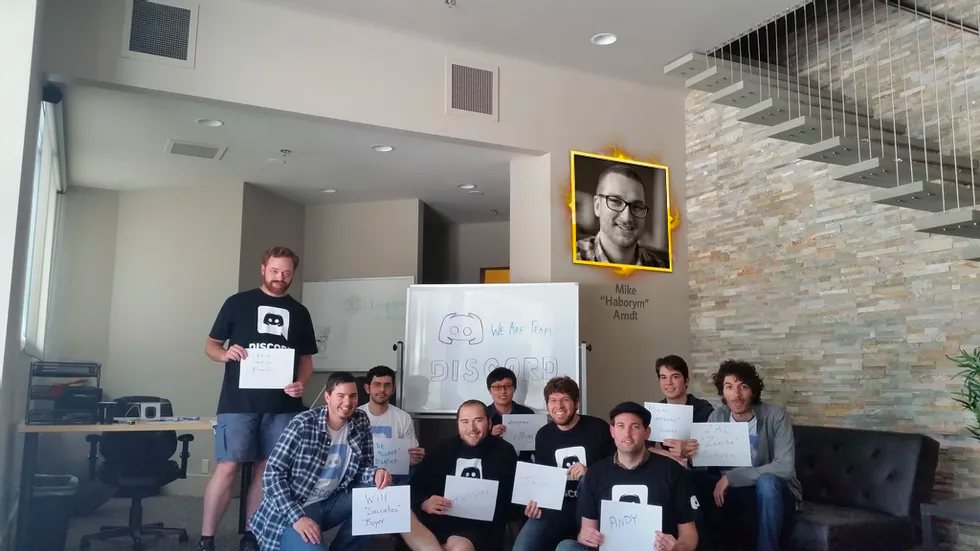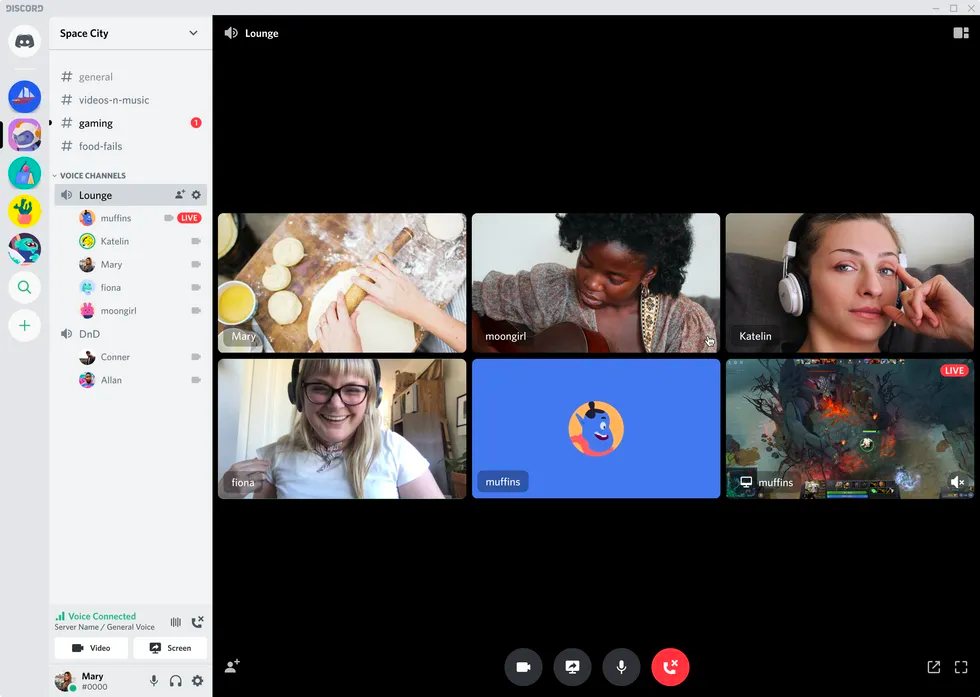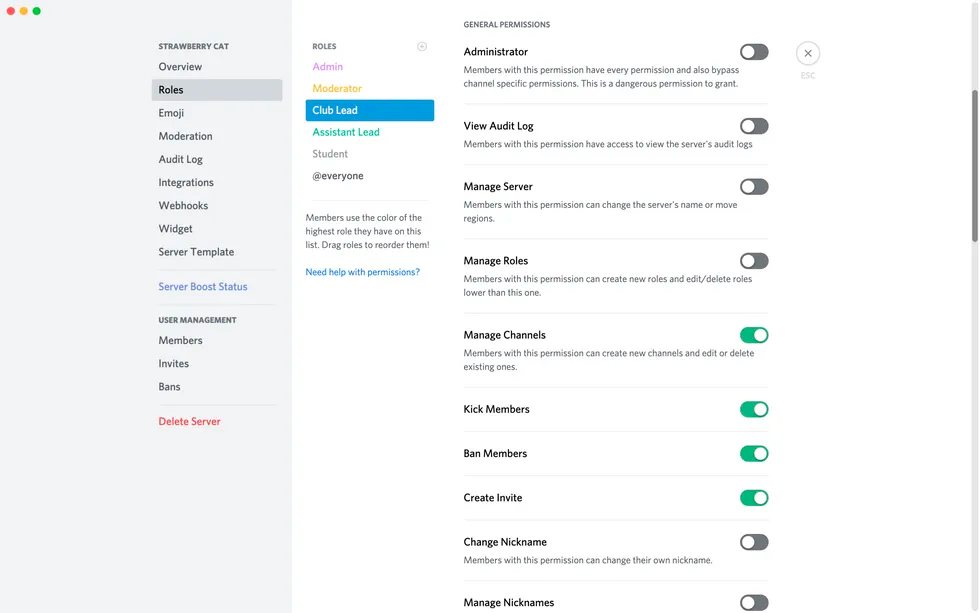The Discord founders just wanted to find a way to connect with their gamer friends. In the end, they created something much more.
Most of the “experienced” Discord users have the same story of how they got started using the app. They loved video games, loved playing with their friends, so they used TeamSpeak or Skype to communicate with each other while playing. Most of them didn't like TeamSpeak and Skype at all, but there really were no other options.
Over time, many of these gamers have realized one thing. They wanted to communicate with their gamer friends even outside of games, and not only talk about games. Their playmates ended up becoming their real-life friends. And then at the beginning of 2015, a new messenger called Discord appeared on the market. It was promoted under a slogan that was not distinguished by grace: "Forget Skype and TeamSpeak." It had text chat, which was nice, but most importantly, it had better voice chat than anywhere else.
Initially, users set up private servers for their friends to play together, and some more adventurous set up public servers to make new gaming friends. “In real life, I don't have that many players I know,” a Discord user known on the platform as Mikeyy told me. So when I played Overwatch, I created my first community to play online with anyone. You play a couple of games with someone and then you usually say: it was cool, what is your nickname on Discord? "
If you rewind a few years ahead, we will see that Discord has moved to the center of the gaming universe. Its monthly active users exceed 100 million, uniting millions of all kinds of communities and players. Its largest servers have millions of members registered. Discord is also taking advantage of all this popularity to gradually grow the business and is now taking a sharp turn: It aims to turn the platform into a communication tool not only for gamers, but for everyone - from student groups to sports shoe enthusiasts and gardeners. Five years later, it is only now becoming clear to Discord that it may have opened up something of a future for the Internet. And almost by accident.
Throwing all my strength
Discord's story is actually full of twists and turns. Without them, it would be impossible to imagine the existence of this messenger. Long before trying to invent new forms of communication, co-founder Jason Citren was just one of those guys who just wanted to play along with their friends. “This was the Battle.net era, if you like,” he told me (via Discord chat, of course). "I played Warcraft a lot online, had a little interest in MMO games like Everquest." One day he almost got kicked out of college after spending too much time on World of Warcraft.
Sitren learned how to code because he wanted to create games, and he intended to do just that after graduating from college. His first company started out as a video game development studio and in 2008 even posted his game on the iPhone App Store as soon as that store opened. Nothing came of it, but later turned into a social network for gamers called OpenFeint, which Sitren describes as "actually Xbox Live for the iPhone." He sold it to the Japanese gaming giant Gree, and in 2012 founded another company, Hammer and Chisel, "with the idea of creating a new kind of gaming company more focused on tablets and mainstream multiplayer games." She developed a game called Fates Forever, an online multiplayer game much like League of Legends.
%20and%20Jason%20Citron.jpg)
Discord co-founders Stan Vishnevsky (left) and Jason Citren. Photo: Discord
And then a typical Silicon Valley thing happened: Sitren and his team realized that the best feature in their game was chat (which is not too flattering about the game, but I hope you understand me). This happened in 2014, when everyone was still using TeamSpeak or Skype, and everyone still hated TeamSpeak and Skype. Sitren and the development team at Hammer & Chisel knew they could make the product better and decided to give it a try.
The transition was painful. Hammer & Chisel closed the game development department, laid off a third of the company's employees, placed many in new positions and spent six months trying to change the company's orientation and culture. No one was sure if this new idea would work. “When we decided to put all our energy into Discord, we had at most 10 users,” Sitren recalls. - There was one group of League of Legends players, one WoW guild and nothing else. We showed Discord to our friends, they said it was cool and they never used it after that. "
After chatting with users and seeing the results, the team realized their problem: Discord was definitely better than Skype, but still not good enough. Calls dropped, quality suffered. Why would anyone need to swap out a tool they hated for another that they would hate over time? In its first few months, the Discord team had to completely redesign its voice technology three times. Around the same time, a function appeared that gave users the ability to moderate and ban other players on the server, give them roles and permissions. It was then that Discord testers immediately saw the superiority of the program. And they told their friends about it.
Today Discord considers its launch date May 13, 2015, when other people started to really use the service. Someone posted a Discord post on the Final Fantasy XIV subreddit with a link to the Discord server where they could discuss the new expansion pack. Sitren and another co-founder of Discord, Stan Vishnevsky, immediately entered the voice chat on the server and began to communicate with everyone who appeared there. Redditors after these conversations began to post messages in the spirit of "just talked to their developers, cool guys" and send even more gamers to Discord. “On that day,” Sitren says, “a couple of hundred people registered with us. Then everything started like a snowball from a mountain. "

First Discord Team, approx. 2015 Photo: Discord
The first cohort of Discord users included a gamer known on Discord as Vind. He and his friends, fans of Battlefield 4, switched to the new app from TeamSpeak after their communication began to go beyond talking only about Battlefield: “We began to move away from being focused only on the game to becoming a community for all". Discord allowed them to set up different channels for conversations on different topics, maintain some semblance of order in the midst of chaos, appear in the chat and disappear from it at will. But, according to Vind, the following was particularly appealing: "It's the ability to just jump into an empty voice chat, basically saying to everyone: Hi, I'm here, who wants to chat?"
Almost everyone I spoke to referred to this same example to explain exactly how Discord differs from other apps. Voice chat on Discord is not like an online call, it does not require dialing or exchanging links and passwords, or indeed any formalities. Each channel has dedicated space for voice chat, and anyone who enters it is immediately connected and can talk. Perhaps the most appropriate comparison would be as if you walked into a room and plopped down on the sofa, simply saying: I'm here, how are you?
This can be added to the list of those Discord features that have been surprisingly successful. From the standpoint of today, much, of course, looks obvious. Vishnevsky compares this to the feeling “like you're in your neighborhood or home, where you can walk from one room to another,” which radically sets Discord apart from most online social apps. Discord lacked gamification systems, follower counters, and algorithmic feeds. According to Citren, Discord "created a space on your computer and your phone where you felt surrounded by friends to meet, talk and hang out with." When you launch Discord, you see that some of your friends are already in the voice chat and you can immediately join them.
Third place
All this is completely difficult from a technical point of view. “This definitely requires a different approach to building the system architecture,” Vishnevsky said. The company has worked hard to make it easier to log into the chat voice channel from a phone and then smoothly transition to it when you open Discord on a computer. And it continues to work to reduce latency, the main enemy of all real-time communications developers.
The company recently added video chat to Discord as the next prerequisite for high quality communication. The team wanted to find a way to share screen content while playing, effectively offering a small or private Twitch that would allow users to stream games for friends to watch. Achieving this with 4K quality and 60 frames per second was already difficult in itself. The developers also questioned how exactly this feature should be implemented: is it worth adding a separate channel for video, or will it be difficult for users to switch between voice and video chat? As a result, they added it to the voice channel not as a replacement for voice chat, but as another improvement.
Strictly speaking, what Discord offers is not much different from what users are able to find on other platforms. On the one hand, it strongly resembles Slack, combining the publicity of the channels with the ease of running side chats and a ton of ways to lure the right people. Discord is also a bit like Reddit with its many endless discussions that you can participate in on a regular basis or easily join by logging into the chat (actually, even many popular subreddits now have separate chats on Discord for redditors to communicate in more real time). Discord uses simple status indicators to show who is online and what they are doing. But by combining all of the above in a way that gives the user the feeling of partying rather than work, Discord has managed to find a great idea.
Flexibility is the main feature of Discord (besides the fact that everything should work without problems). The company has always considered it important to build the right communication chain - from text to voice and video. Communities can decide for themselves who gets access to certain tools and shape their space as they see fit. But that's not all. While, for example, in a video chat, you can choose someone else's video to watch, and not just your own. You can also sit in several chats at the same time, focusing on one, and sending the rest to the background. “The idea is for everything to work harmoniously,” says Vishnevsky, “but not to focus entirely on something specific, like in Google Meet or Zoom. Passive use is also the main function. " When users say that Discord is just better for them,
While Zoom, Teams, and others focused on expanding video conferencing capabilities (separate chat rooms, answering questions, integration into production tools, transcripts, and more), Discord continued to delve deeper into quality and latency issues. “We've invested a lot in deep GPU integration,” notes Vishnevsky. - The problem of voice communication on a large scale was solved a long time ago, but we wanted to solve it for a situation where 1000 people occupy one voice channel, so that everyone could speak with a submillisecond delay. It doesn't really matter in video conferencing. ” It turned out, however, that gaming is by no means the most important here.

Video chat has become one of the more recent features of Discord, and it looks like everyone is enjoying it. Image: Discord
As Discord evolved, some of its communities continued to grow as well. Soon, many of them found their face outside of gaming. A Vind user, shortly after signing up on Discord, had to take over the oversight of a fairly large community of Formula 1 racing... “I didn't actually create it,” says Vind. “It was founded by another person, after which he practically immediately abandoned it.” Vind joined him from the start, in 2016, when there were only about 50 people on the server. He decided to see who is in charge of the server and, accordingly, has complete control over it, but found that it was a Discord user who no longer had anything to do with the community. Vind ended up tracking him down on Reddit and asking him to relinquish admin rights so that some new features could be added to the chat. “And then he just gave me all the responsibility,” explained Vind. His predecessor chose to start creating a Formula 1 group based on the Kik messenger, which seemed to him the best platform (oops).
Vind's goal was to create a large community, but not around any particular game. And not even necessarily on the topic of racing. "I wanted to create something like a wide community where everyone feels welcome and just shares an interest in Formula 1."
Now the Formula 1 server has 5700 users. The history of the Internet suggests that groups of this size almost inevitably experience an insurmountable chaos that inhibits moderation and community development. There were, of course, problems, according to Vind, but they were mostly overcome. Discord bot moderator CarlBot does a very good job of automatically removing problematic posts and alerting moderators. “If that happens, we ban users,” says Vind. "We don't need people in the community who use such expressions." These rules are accepted here, and new users registering on the Formula 1 server are required to read them and give their consent before they are allowed to post messages.
"What kind of society we would like to see"
But not everyone did it so smoothly. Serious issues were widely reportedthat Discord has raised in connection with controversial content. In the past, it was used to group the regulars of the 4chan and 8chan web forums; the servers of the Kool Kids Klub were operating, uniting slightly disguised Klans; there have been countless examples of online bullying, hate speech and other outrageous behavior. However, this is observed everywhere. What happens on the platform doesn't differ significantly from, say, what happens on Reddit or Facebook, but experts have expressed their concerns about Discord, as oversight of the platform was hampered by its semi-private nature and limited number of employees. Since Discord users are mostly youngsters, this also comes with additional challenges.
Today, Discord staff admit that they noticed it too late. The platform's problematic content was not noticed until after the 2017 violent protests in Charlottesville, which were long planned and openly discussed on Discord. Prior to that, there was no trust and security group on Discord; Sean Lee, who leads this group, joined the company about a month before the events in Charlottesville. However, the company believed for too long that it would be enough to keep the worst out of the platform: porn, racial slurs, openly illegal content. She closed her eyes to everything else, believing that since this is not a public space, there will not be much harm. Do not register on the server and no one will come for you.
Now the company has a different point of view. “Discord is like a country with 100 million people scattered across different states and cities,” says Lee. "We set rules on what is acceptable to help shape society as a whole, and empower moderators and server administrators to help us enforce the rules and expand them based on community needs." Lee is committed to helping moderators shape any communities of their choice, with Discord providing moderators with ever more sophisticated tools and know-how, but only within the platform-wide boundaries. These boundaries have appeared relatively recently. Discord is now trying to just state clearly and decisively what is acceptable and what is not, and ensure consistent compliance with these rules. The company invests in bots and other automated moderator tools, but the Trust and Security team currently includes over 15% of Discord's staff. While a lot of unsightly things are still happening on the platform, progress is quite obvious.

Discord rules have been added, but much is left to the discretion of the moderators. Image: Discord
Meanwhile, Discord also had to figure out how to make money. The urgency of this problem is significantly lower: the company raised almost $ 400 million, including $ 100 million this summer, bringing its value to $ 3.5 billion. Forbes estimates its revenue at more than $ 120 million this year. Discord still has plenty of room to run. But that being said, it can often be hard for huge communication platforms with a tarnished reputation to take off (you can ask Twitter and Reddit). Over time, the company will have to deal with making real money. So far, both Sitren and Vishnevsky are strongly opposed to posting ads or trading user data.
Users have been making money on Discord for a long time. Mikeyy, for example, eventually moved from playing Overwatch to managing a large server for FIFA players, focused on those who prefer her addicting Ultimate Team mode. As part of this wider community, Mikeyy and his team of moderators and admins run a VIP server for $ 13.99 a month to provide exclusive shopping tips and advice and more. All settlements go through PayPal and similar services, so Discord doesn't get a dime. Over the past couple of years, Discord has become a place for numerous streamers, influencers and others to communicate more directly with their fans. Discord is officially integrated with Twitch, Patreon and many other platforms, but it doesn't get anything from them either.
So far, Nitro remains the main source of revenue for Discord, a paid service that allows users to change their nicknames, get access to more emojis, and improve the quality of video and voice chats for $ 10 a month. However, Discord has always had big plans. One of them looked obvious: Selling games to gamers! In 2018, the Discord Store launched on Discord, offering individually curated games. Leaving TeamSpeak and Skype behind, Discord decided to take on Steam. From this, however, nothing came of it. Users went to Discord not looking for games, but to chat with friends. The store only lasted a few months, and Nitro Games, Netflix's gaming service, much like Xbox Game Pass and PlayStation Now, even less.
The discord store failure was instructive for the company. And that led to another twist: Discord shouldn't be about video games, but about being a place to hang out with friends. Now, in the era of Fortnite, Minecraft, Roblox and many other games, being together has become much more important than what's happening on the screen.
"Here you can talk"
Since its inception, Discord has been used for non-gaming purposes (up to 30% of the servers were dedicated to other topics), but the team never gave it much thought. This issue has been in the spotlight since last year. The company has organized focus groups and user surveys trying to figure out how millions of people use Discord. Among the questions asked was this: "What is the most common misconception about Discord?" The answer was almost unanimous: "This is a platform for gamers." Those looking to bring their study group / knitting club / origami class / sneaker collector group to Discord ran into problems,
In early 2020, as Discord embarked on a massive reorganization and rebranding to help the company increase its appeal to the general public, COVID hit. Suddenly, everyone was stuck at home, and the Internet became the primary means of communication with friends. From February to July, the number of Discord users increased by 47%, with all these newbies learning what millions of gamers already knew: it's great to have a place to hang out with your friends, and the best way to do it is on Discord. Discord began to be used by groups of students; the teachers started teaching it; friends started hanging out on it, as they usually did after school or on weekends.
Discord's rebranding was completed at the end of June. The new slogan is “Your Place to Chat”, and the home page has largely been cleared of game jargon and confusing instructions (although hints of gaming have remained, from the alien controller logo to the .gg at the end of each Discord URL). “Looking at the past few months,” Sitren and Vishnevsky wrote in their blog posts announcing the redesign, “it’s more and more obvious that as people spend more and more time on the Internet, they feel the need for an online space where they could feel real humanity and a sense of their own need. "
Discord still has a lot to do over the next few months and years, especially in terms of further enhancements to its moderation tools, as well as ensuring that communities on the Discord platform exist the way the company wants them to. And, as new features are added (of course, every gamer would like to see virtual and augmented reality features over time), the company will have to figure out how to achieve all this without the excessive difficulties that it has managed to avoid so far.
Over the past five years, however, it has become clear that Discord has evolved into something very special. A space has emerged around him, in which you feel completely different from anywhere else on the Internet. This is not group chat, forums or conference calls in the full sense of the word. Discord brings all of them together and yet is not like them. It turns out that in the midst of all this chaos, there is a place that allows you to be human and communicate with others much more closely (for the better, and sometimes for the worse) than in other nooks of the Internet. This is not what Sitren, Vishnevsky and their team were striving for, but this is what they ended up with. And they no longer need to make sharp turns.








